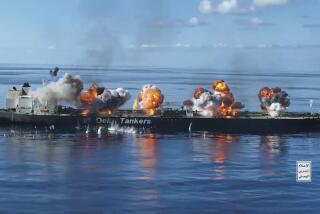Russians’ Warning Shots Halt Greenpeace Vessel
- Share via
MOSCOW — A Russian coast guard vessel fired warning shots Monday at a Greenpeace ship as it tried to investigate the environmental threat posed by a vast nuclear dump site inside the Arctic Circle, officials said.
After firing flares and repeatedly ordering the Solo--a 219-foot ship owned by the maverick environmental group--to leave Russia’s economic zone, the Ural patrol vessel “was forced to fire several warning shots with a 30-millimeter cannon,” said Vladimir Biketov, a Russian official spokesman.
“Greenpeace has good goals--they’re fighting for ecology, so we will all live in a clean world,” he added. “But the law is the law. They should not provoke our troops to take such extreme measures.”
Greenpeace reported that “three shots were fired across the stern” of the Solo, said Eleanor O’Hanlon, a Moscow-based spokeswoman for the group. Two officers and 10 enlisted men from the Ural boarded the Solo and were still investigating hours later, she added. All contact with the ship was cut.
“We respect Russian borders,” O’Hanlon said. “But the threat from the massive radiation in the northern seas is very real, and radiation does not respect any borders.”
Greenpeace has repeatedly sought permission to travel to the area from Russian authorities, who have been very secretive about their disposal of nuclear waste, O’Hanlon said. She said the requests went unanswered.
“What sort of information could be so secret that it requires the use of military force against unarmed environmentalists?” Steve Sawyer, Greenpeace’s executive director, asked from the group’s Amsterdam headquarters.
The shots were fired while the Solo was outside Russia’s territorial waters. But the ship was inside Russia’s economic zone, which extends 20 miles from shore. Russia claims the right within that area to “full control for all foreign ships,” Biketov said.
When the shots were fired, a six-member Greenpeace team on a large inflatable craft launched from the Solo was on the way to monitor the area near a discarded nuclear K-27 submarine. The sub’s reactor had several accidents before it was dumped in the shallow waters off Novaya Zemlya in 1982. The small boat was called back after the shots were fired, the Greenpeace spokeswoman said.
“All Greenpeace is trying to do is gather information about the nuclear reactors and submarines, which have been dumped into the ocean around Novaya Zemlya,” said John Sprange, coordinator of the Greenpeace mission.
At least 15 nuclear reactors, including six sub units still containing uranium fuel, have been dumped in the waters off Novaya Zemlya, an island inside the Arctic Circle surrounded by the Barents and Kara seas, said Andrei A. Zolotkov, a Russian radiation safety engineer with the Murmansk Shipping Co.
Thousands of seals are dying of cancer caused by radioactive pollution of the seabed and fallout from Soviet nuclear tests staged west of the Kara Sea on Novaya Zemlya, the archipelago where the seals spend most of the year, according to the Northern Polar Institute in the far northern Russian city of Archangelsk.
The Monday encounter was not the first between Greenpeace and authorities in the region. Two years ago, a Greenpeace ship docked off Novaya Zemlya and sent a team to measure radiation levels at the nuclear testing site there; authorities seized the ship and towed it to a KGB base outside Murmansk.
Anatoly Mostovoy, a member of the Russian legislature, is a passenger aboard the craft. When the Ural first threatened the Solo after it ventured into Russian waters without permission Sunday, Mostovoy said: “Your response is a little serious. This ship is not a threat to Russia.”
When they boarded the Solo, the Ural’s officers had a special message to Mostovoy: “Your activities constitute a gross violation of the U.N. convention on sea law and Russian laws on state border and the economic zone. . . . If the Solo violates the rules of conduct in the Russian economic zone, you will be regarded as an accomplice to the crime,” Capt. Valery Novikov, head of the press service of the Russian navy, told Itar-Tass.
More to Read
Sign up for Essential California
The most important California stories and recommendations in your inbox every morning.
You may occasionally receive promotional content from the Los Angeles Times.













